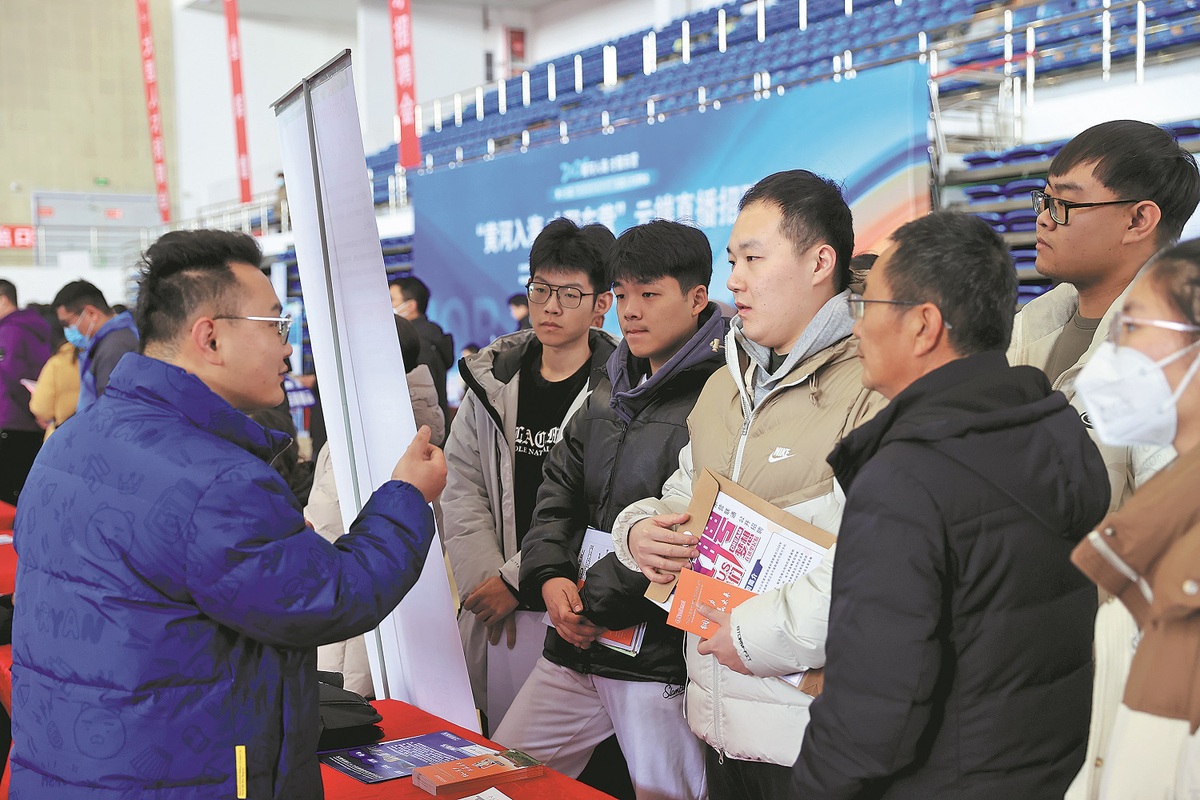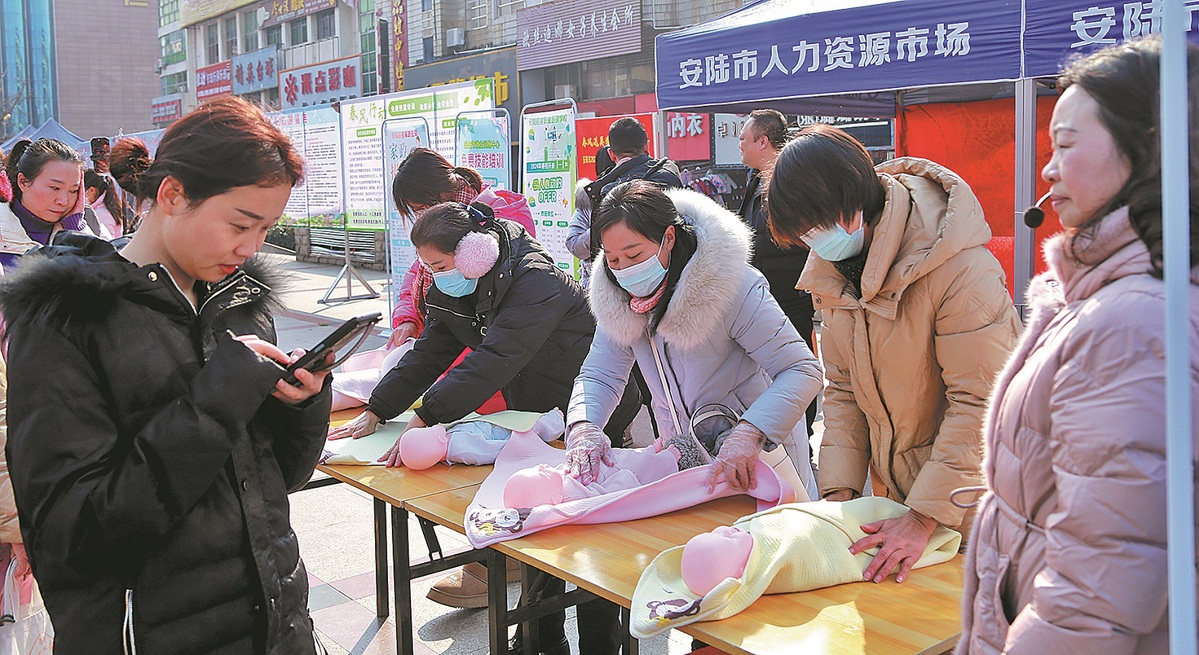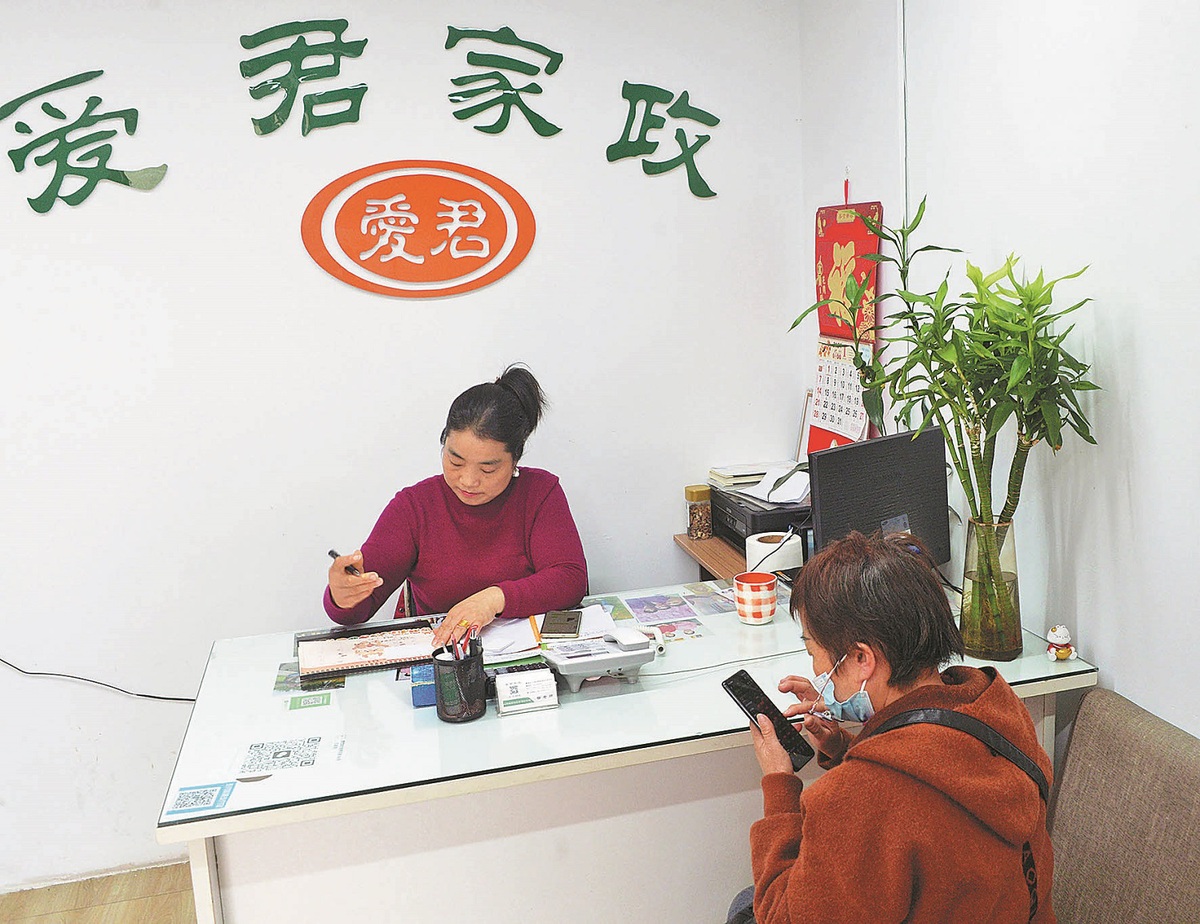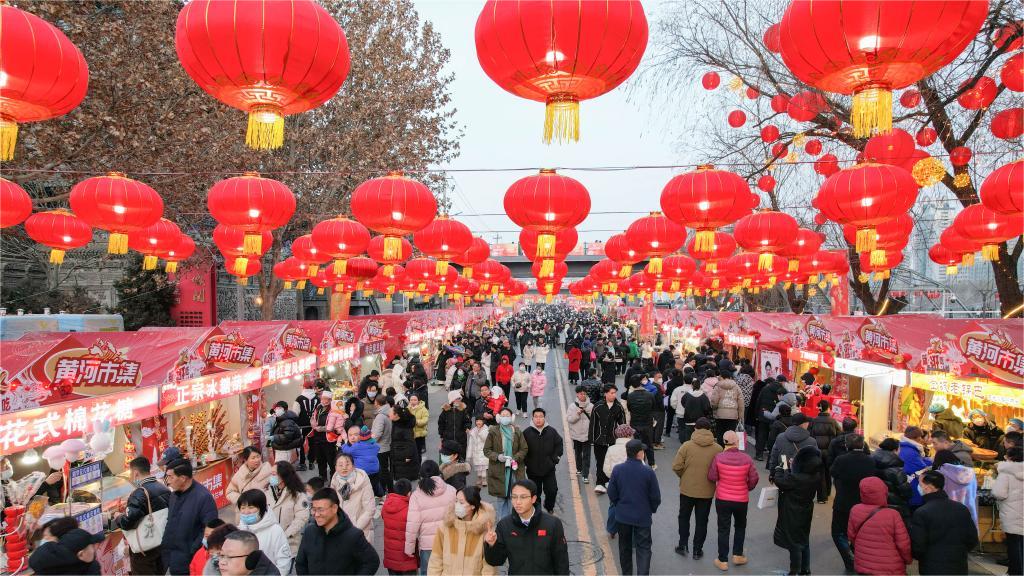How employers make new year work

Job hunters consult an employer about posts at a job fair held in Dongying, Shandong province, on Jan 27. Over 200 enterprises provided over 8,000 vacancies at the fair and over 3,000 people participated. CHINA DAILY
The many millions of people heading home for Spring Festival each year make China the scene of the world's largest annual human migration.
While that's good news for transport operators and travel agents, other sectors face the challenge of finding temporary workers over the holiday to replace those on the move.
It's a problem one woman in Shanghai grappled with before this year's Spring Festival holiday, sending multiple recruitment notices to friends and neighbors on the WeChat social media platform looking for someone to step in as a caregiver for her frail, elderly parents.
She said she had been mentally prepared for the Spring Festival "nanny shortage" and had tried to make reservations for a temporary live-in caregiver with several domestic services agencies. But they failed to respond to her requests.
The lingering effects of the COVID-19 pandemic meant her parents' regular caregiver did not return home last year, and she asked for a longer period of leave this year as a result.
"My parents are in their 90s, have serious underlying diseases and show signs of dementia," the Shanghai resident, surnamed Chu, said, adding that she also had to keep an eye on her grandson during his winter holiday.

Job seekers showcase parenting skills at a job fair in Hubei province. CHINA DAILY
Job advertisements for temporary caregivers and babysitters for the holiday began to proliferate at the end of last year, heralding the seasonal labor shortage.
Experts said that to tackle it, companies with many migrant workers made early arrangements and job markets made timely adjustments to minimize disruptions to business operations and people's lives.
"The impact of the seasonal labor shortage varies across industries," said Lin Ka, a professor at the School of Public Affairs at Zhejiang University. "For most industries, it is not a major concern, as the current labor demand in the job market is not particularly high. Only sectors that deal with holiday activities or care services may encounter some challenges."
Pang Shi, director of the Chinese Academy of Personnel Science's department of employment and entrepreneurship in Beijing, said the post-pandemic economic recovery and an associated rebound in travel were likely to have exacerbated Spring Festival labor shortages in industries such as tourism, catering, e-commerce and home services.
Hua Xin, deputy head of the Shanghai Home Service Industry Association, confirmed the trend in elder care services in an interview with Laodong Daily, a newspaper in Shanghai, and said the number of temporary job vacancies had risen before Spring Festival this year.
Hua said that in Shanghai's Minhang district, for example, up to 20 percent of vacancies looking for people to provide home care for the elderly during the holiday had not been filled.
Guo Jiqiang, a professor at the School of Economics at Zhejiang University, attributed the seasonal labor shortage to a range of factors.
"On the one hand, people's career choices do not match the market demand," he said.
Guo said young people were opting for jobs with less regulation and fewer restrictions, and preferred to deliver packages rather than take up repetitive and monotonous factory jobs.

A job fair providing posts in the manufacturing and service industries is held in Hefei, Anhui province, on Jan 26. XIE CHEN/XINHUA
In addition, the skewed perception that domestic workers were inferior made young people and even the middle-aged hesitant to work in that field.
"On the other hand, some orders surge significantly before Spring Festival and drop dramatically afterward, causing only a temporary employment gap," he said.
China's tradition of Spring Festival family reunions and the relatively long holiday — eight days this year — promised to bring about a service sector boom.
By late January, travel bookings from Lunar New Year's Eve to the eighth day of the lunar calendar were seven times higher than during the same period last year, according to Meituan and Dazhongdianping, two popular e-commerce platforms for services.
As for the manufacturing industry, Guo predicted a continuation of the regular seasonal rise in demand for festival-related products such as clothing, fireworks and decorations domestically, with the biggest growth in foreign demand to be for new energy vehicles.

A housekeeping company employee consults with a housekeeper about working during the Spring Festival holiday on Jan 16. CHINA DAILY
"Most companies have already established a comprehensive coping mechanism to deal with this annual phenomenon and are reluctant to invest much more money and energy to make a big change," he said.
Around 80 percent of the employees at Chant Tech, a new materials company in Huzhou, Zhejiang province, are migrant workers.
With orders for wiring harnesses for new energy vehicles and tungsten wire for solar power systems up 30 percent year-on-year, the company once again offered incentives to retain workers and recruit new ones to ensure orders can be delivered on time after the holiday.
Over 200 temporary workers started a week of pre-job training on Jan 10, much the same as in previous years.
"On top of triple wages, regular and temporary employees who stay on during the Spring Festival holiday are provided with an additional subsidy of 200 yuan ($27.90) per day," deputy general manager Zhao Jianxue said. "Adding the regular paychecks during the training period, it's already a significant expenditure."
He said 80 of the temporary workers were students from vocational schools in provinces such as Hunan, Shandong, Yunnan and Guizhou, adding that the school-enterprise cooperation programs had been established for years, and the students were easier to manage than random recruits.
The service industry has also recruited college students to work part-time, starting during the winter holidays.
Despite this year's Spring Festival beginning nearly 20 days later than last year's, the Hilton Beijing Tongzhou hotel, expecting a surge in tourism, started the recruitment process for its catering department much earlier. The first batch of temporary workers began working on Jan 8, whereas the recruitment notice had not even been released by that date last year.
The hotel said applicants "should have good command of a foreign language and etiquette to serve international guests", and also required them to provide proof of their college enrollment.
This year, the salary was increased by 25 percent to 3,000 yuan a month.
Guo said that the recurring seasonal labor shortage should not be a cause for panic, as the market was resilient. However, local governments should map the market situation, remind companies to make early arrangements and provide coordination.

Workers take a chartered bus to return to work in Nanjing, Jiangsu province, on Jan 31 last year. YANG BO/CHINA NEWS SERVICE
In Shanghai, "shared caregivers" emerged as an interim response. After seeking permission from their employers, live-in caregivers could temporarily offer household management services to another family for a few hours during the day. They got to earn a much higher hourly rate for the extra work, and their existing employers could pay them a bit less while retaining their services at night.
Shanghai also set aside over 100 beds in nursing care homes to meet elderly people's demands over the holiday and increased wages for caregivers. In Shanghai's Changning district, the wage for domestic workers was almost doubled to 80 yuan an hour from the day before Lunar New Year's Eve to the eighth day of the lunar calendar.
As well as playing a role on the demand side of the labor market, China's aging population will also have an impact on labor supply.
Guo said the decrease in the working-age population will inevitably lead to a decrease in overall labor supply, while an older workforce will be less adaptable, "exacerbating the severity of labor shortages".
He said one way to address the issue was to improve the matching of job seekers and vacancies, including holding more recruitment events in areas where labor is relatively abundant.
But it was also important for employers and local governments to retain workers by offering competitive benefits and giving migrant workers better access to public services.
Pang, from the academy of personnel science, said Spring Festival was a turnover period for companies, because after working for a year in a strange city and then enjoying a one-week stay with family members, some people might choose not to return to their jobs. That had led workplaces and some labor-exporting provinces, such as Sichuan, Henan and Shandong, to introduce measures to help migrant workers return to their posts.
Free flights and trains to make it easier for migrant workers to return to work have been arranged for years on some routes. On the morning of Feb 14, the fifth day of the Lunar New Year, a train carrying over 1,400 workers left Sichuan's Dazhou station for Guangzhou, Guangdong province, marking the 26th consecutive year of trains being chartered trains from the Qinba mountainous area. A day later, 364 workers from Yunnan and Guizhou provinces landed in Fuzhou, Fujian's provincial capital, on a chartered flight.
To meet local demands for high-quality workers, Pang said some regions were also attempting to recruit from other cities within the province or other districts within the city.
Lin said that in the future, the Spring Festival employment situation would mainly depend on the push-pull effect between urban and rural areas and the development of the national economy.
"The present human resources shortage remains under control," he said. "Rather than temporary and low-skilled jobs, what is in high demand are positions requiring high qualifications and offering high salaries."
Photos
Related Stories
- Ministry vows efforts to vitalize job market
- China's industrial upgrades spur surge in hi-tech job opportunities
- Winter tourism boom sparks hiring surge
- China provides over 300 bln yuan for employment assistance in 2023
- China launches campaign to boost employment in spring season
- China creates over 12 million urban jobs in 2023
Copyright © 2024 People's Daily Online. All Rights Reserved.









